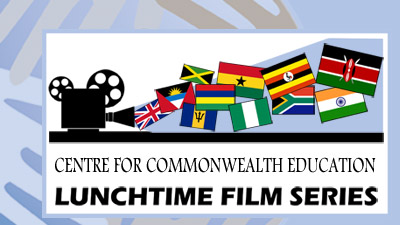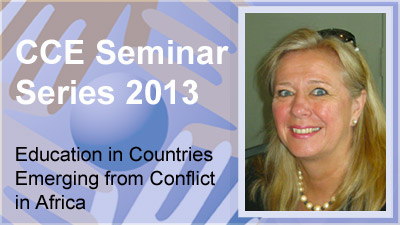ARCHIVE: This material is no longer maintained and should be viewed for reference only
CCE Seminars and Workshops 2014
Further seminar dates for the Education in India series will be posted soon.
Wednesday 26th March, 17.00-19.00, Faculty of Education, Room 1S3
High School Regulatory Environment and Student Disengagement
Guest speaker: Jeremy D. Finn, Graduate School of Education, State University of New York at Buffalo, USA
Abstract
This presentation overviewed research on school environments ongoing in the U.S., asking whether the issues are similar to those in the U.K., and seeking to identify areas in which we may be able to learn from each other through mutual collaboration.
Further details on Talks.Cam
Monday 24th - Tuesday 25th March
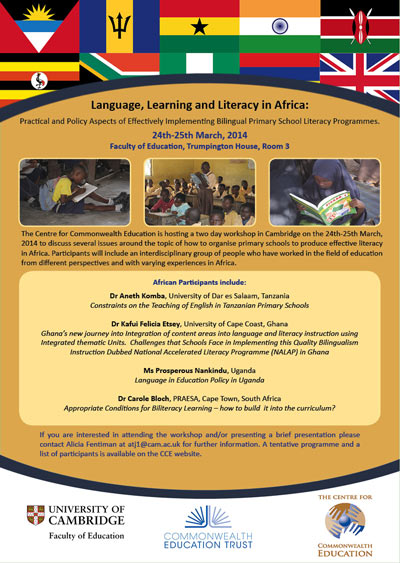 Language, Learning and Literacy in Africa: Practical and Policy Aspects of Effectively Implementing Bilingual Primary School Literacy Programmes
Language, Learning and Literacy in Africa: Practical and Policy Aspects of Effectively Implementing Bilingual Primary School Literacy Programmes
CCE hosted a two day workshop on Language, Learning and Literacy in Africa on 24-25 March, 2014.
Download workshop programme for further details or click on image to download the flyer.
Further details also available via Talks.Cam
Monday 17th March
CCE - Africa Colloquium
Speakers: Euzobia Baine, Bjoern Hassler, Sara Hennessy, Georgina Horrell, Louis Major, Rebecca Nambi, Sue Swaffield and Molly Warrington
Video podcast now available via CCE Collection on the University's streaming media service
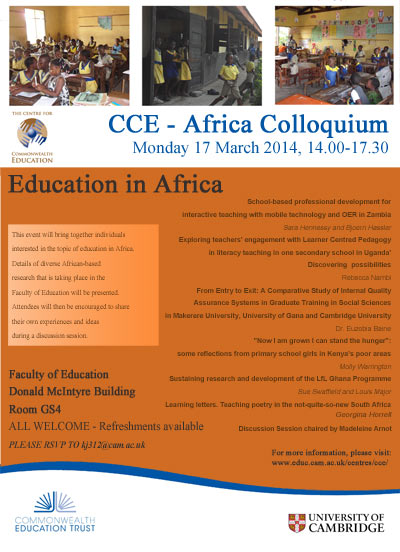 Abstract
Abstract
This event brought together individuals interested in the topic of education in Africa. Details of diverse African-based research taking place in the Faculty of Education were presented. Attendees then went on to share their own experiences and ideas during a fruitful discussion session.
Click on image to view flyer with titles of presentations.
Saturday 8th March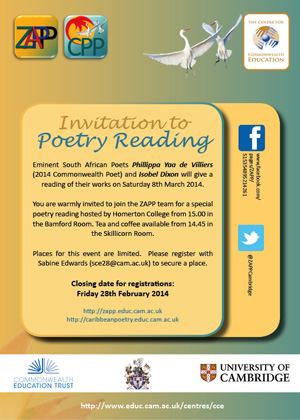
Invitation to a Poetry Reading
We are delighted that eminent South African Poet Phillippa Yaa de Villiers will be visiting the UK, having been commissioned to write and perform a poem for the Commonwealth Observance Day celebrations in Westminster Abbey. During her visit, she and fellow South African poet, Isobel Dixon will take part in a Teachers' Symposium to be held at Homerton on Saturday 8th March. As part of this event, we are delighted to be able to extend an invitation to a special poetry reading during the afternoon session. Please note that places for this event are limited, so to ensure a place, please contact Sabine Edwards (sce28@cam.ac.uk) to register.
Tuesday, 4th March
Public Private Partnerships and the implications for educating youth from poor communities: a view from South Asia.
Dr Shailaja Fennell
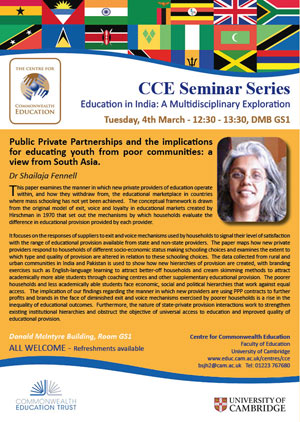 Abstract
Abstract
This paper examines the manner in which new private providers of education operate within, and how they withdraw from, the educational marketplace in countries where mass schooling has not yet been achieved. The conceptual framework is drawn from the original model of exit, voice and loyalty in educational markets created by Hirschman in 1970 that set out the mechanisms by which households evaluate the difference in educational provision provided by each provider.
It focuses on the responses of suppliers to exit and voice mechanisms used by households to signal their level of satisfaction with the range of educational provision available from state and non-state providers. The paper maps how new private providers respond to households of different socio-economic status making schooling choices and examines the extent to which type and quality of provision are altered in relation to these schooling choices. The data collected from rural and urban communities in India and Pakistan is used to show how new hierarchies of provision are created, with branding exercises such as English-language learning to attract better-off households and cream skimming methods to attract academically more able students through coaching centres and other supplementary educational provision. The poorer households and less academically able students face economic, social and political hierarchies that work against equal access. The implication of our findings regarding the manner in which new providers are using PPP contracts to further profits and brands in the face of diminished exit and voice mechanisms exercised by poorer households is a rise in the inequality of educational outcomes. Furthermore, the nature of state-private provision interactions work to strengthen existing institutional hierarchies and obstruct the objective of universal access to education and improved quality of educational provision
Tuesday, 18th February, 12.30-13.30, Faculty of Education, Room DMB GS1
The Economics of Religion in India
Dr. Sriya Iyer
Podcast now available via the CCE Collection on the University's streaming media service.
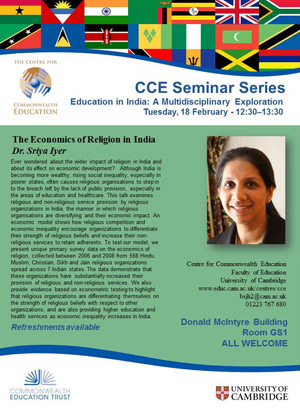 Abstract
Abstract
Ever wondered about the wider impact of religion in India and about its effect on economic development? Although India is becoming more wealthy, rising social inequality, especially in poorer states, often causes religious organisations to step in to the breach left by the lack of public provision, especially in the areas of education and healthcare. This talk examines religious and non-religious service provision by religious organizations in India, the manner in which religious organisations are diversifying and their economic impact. An economic model shows how religious competition and economic inequality encourage organizations to differentiate their strength of religious beliefs and increase their non-religious services to retain adherents. To test our model, we present unique primary survey data on the economics of religion, collected between 2006 and 2008 from 568 Hindu, Muslim, Christian, Sikh and Jain religious organizations spread across 7 Indian states. The data demonstrate that these organizations have substantially increased their provision of religious and non-religious services. We also provide evidence based on econometric testing to highlight that religious organizations are differentiating themselves on the strength of religious beliefs with respect to other organizations, and are also providing higher education and health services as economic inequality increases in India.
Tuesday, 11th February, 12.30-13.30, Faculty of Education, Room DMB GS1
New Visual Methodologies in Teaching Modern South Asian History
Dr Annamaria Motrescu-Mayes
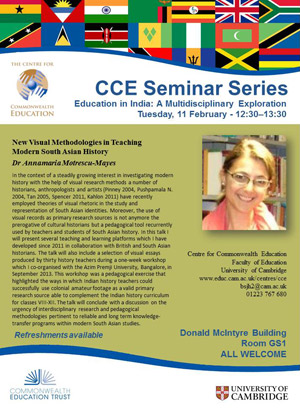 Abstract
Abstract
In the context of a steadily growing interest in investigating modern history with the help of visual research methods a number of historians, anthropologists and artists (Pinney 2004, Pushpamala N. 2004, Tan 2005, Spencer 2011, Kahlon 2011) have recently employed theories of visual rhetoric in the study and representation of South Asian identities. Moreover, the use of visual records as primary research sources is not anymore the prerogative of cultural historians but a pedagogical tool recurrently used by teachers and students of South Asian history. In this talk I will present several teaching and learning platforms which I have developed since 2011 in collaboration with British and South Asian historians. The talk will also include a selection of visual essays produced by thirty history teachers during a one-week workshop which I co-organised with the Azim Premji University, Bangalore, in September 2013. This workshop was a pedagogical exercise that highlighted the ways in which Indian history teachers could successfully use colonial amateur footage as a valid primary research source able to complement the Indian history curriculum for classes VIII-XII. The talk will conclude with a discussion on the urgency of interdisciplinary research and pedagogical methodologies pertinent to reliable and long term knowledge-transfer programs within modern South Asian studies.
Monday 9th December, 16:00-17:30, Faculty of Education
Learning from Good Practice: Raising School Performance in Developing Countries
Noah Yarrow, World Bank
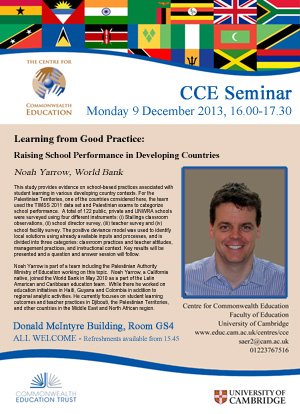 Abstract
Abstract
This study provides evidence on school-based practices associated with student learning in various developing country contexts. For the Palestinian Territories, one of the countries considered here, the team used the TIMSS 2011 data set and Palestinian exams to categorize school performance. A total of 122 public, private and UNWRA schools were surveyed using four different instruments: (i) Stallings classroom observations, (ii) school director survey, (iii) teacher survey and (iv) school facility survey. The positive deviance model was used to identify local solutions using already available inputs and processes, and is divided into three categories: classroom practices and teacher attitudes, management practices, and instructional context. Key results will be presented and a question and answer session will follow.
Noah Yarrow, a California native, joined the World Bank in May 2010 as a part of the Latin American and Caribbean education team. While there he worked on education initiatives in Haiti, Guyana and Colombia in addition to regional analytic activities. He currently focuses on student learning outcomes and teacher practices in Djibouti, the Palestinian Territories, and other countries in the Middle East and North African region.
Thursday, 5th December, 13.30-15.30, Faculty of Education, Room 2S8
Young People Still Revolting into Style as a Political Act: Mixing and Breaking the Urban Codes of Austerity and Xenophobia
Dr Jo-Anne Dillabough, Charlotte Rochez and Professor Wendy Pullan
Abstract
In this workshop/presentation, we seek to achieve the following: first, through analyses of documentary evidence (e.g. media reports) and art and music produced by young people living in council estates (Tottenham, UK) or townships (Cape town, South Africa, Lavender Hill), we showcase the diverse ways in which young people who are targeted by police or have ‘done time’ respond to and navigate exclusions associated with the changing city under austerity agendas and heightened racial conflicts. We further explore how the embodiment of racial conflict and urban change are expressed through young people’s artistic and political lives as they confront social housing cuts and rising income disparities in comparative urban contexts. Finally, we make an argument for bridging some of the affective dimensions of living the city with earlier understandings of youth styles as revolt (Hebdige, 1979), and in particular the ‘status and meaning of revolt, the idea of style as a form of refusal as the elevation of crime into art’ (Hebdige, 1979).
The workshop will be broken down into two parts. The first will explore the research and findings of our comparative research and the work of Professor Pullan on her Divided Cities project. The second part will focus on examining forms of visual methodology and material remnants from past time (e.g., photos, film footage, archival documents, artifacts) as a way of expanding our understandings of comparative ethnographic research, and the use of visuals as major teaching tools.
Monday 25th November, 12:30-13:30, Faculty of Education, Room DMB GS3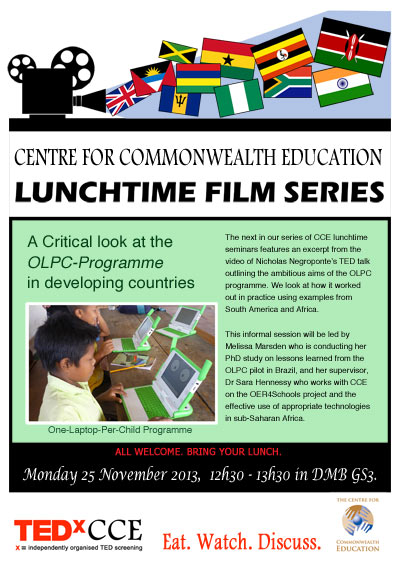
CCE Lunchtim film series
Watch and discuss the outcome of the One-Laptop-Per-Child Programme
ALL WELCOME
Bring along your lunch and join us for this informal lunchtime session.
For further information contact Jill Gather (jg611@cam.ac.uk) at the CCE office.
Thursday 31st October
CCE Lunchtime film series: Poetry & Education
Watch and discuss Sarah Kay's 'If I should have a daughter...'
An independent screening of a TED talk.
Open seminar series: ALL WELCOME
Thursday 17th October, 12:30-13:30
The Right to Education (India) an Inclusive Act?
Akanksha Bapna, CCE Reciprocal Visiting Scholar
In 2009, the Right of Children to Free and Compulsory Education (RTE) became a law in India. The Act has ratified education as a fundamental right and seeks to promote equitable access to education for all children up to the age of 14 years. In this presentation, I discuss the mixed nature of inclusveness of the act. On the one hand, the stringent norms for operating schools in India pose restrictions on private school owners as well as parents, and distort the incentives for improving quality of education. On the other hand, the Act mandates reservation of 25% of the entry-level seats in all private schools for government-sponsored students from economically and weaker sections (EWS) of society with the rationale that this will lead to better learning outcomes for EWS students and increased levels of integration between children from different sections of society.
In this presentation, I discuss this apparent disconnect through a study of the social and financial implications of the Act’s norms and standards using a small sample study conducted in Delhi, and simultaneously examine the opportunities and pitfalls of this reservation policy. Finally, through the lens of a study on primary school vouchers given to 400 randomly selected students in Delhi, I propose a mechanism to reconcile the two contradictory aspects of the Act.
Wednesday 16th October, 13:00-16:00
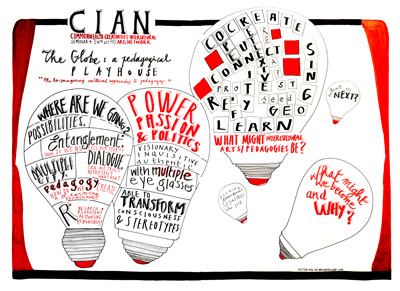 CIAN Public Forum 4: Re-imagining intercultural approaches to pedagogy
CIAN Public Forum 4: Re-imagining intercultural approaches to pedagogy
Convenor: Liz MacKinlay, University of Queensland
Abstract:
This final forum in the CIAN 2013 series examined the role that 'interculturality' and 'indigeneity' play in our understanding of pedagogy, drawing on indigenous, critical curriculum and feminist perspectives and encouraging delegates to develop their ideas through partipation in a range of hands on activities.
Participants from all four fora will be invited to collaborate in a book project, publication of articles and further development of the network.
Wednesday 9th October, 13:00-16:00
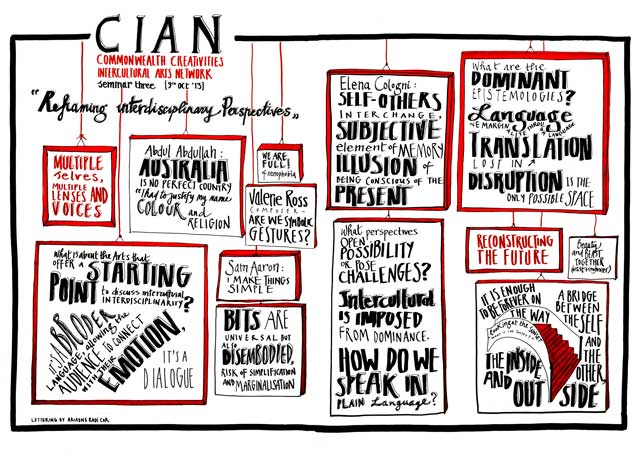 CIAN Public Forum 3: Re-framing interdisciplinary perspectives
CIAN Public Forum 3: Re-framing interdisciplinary perspectives
Convenors: Andrew Blackburn and Jean Penny, University of Pendidikan Sultan Idris
Abstract:
The Forum explored interdiscipliary perspectives on the understanding of intercultural practices focusing on how we engage with epistemological diversity, examining the construction of 'interculturality' and 'indigeneity' across disciplines, and considering diverse types of specialisation and the nature of disciplinary socialisation.
Wednesday 2nd October, 13:00-16:00
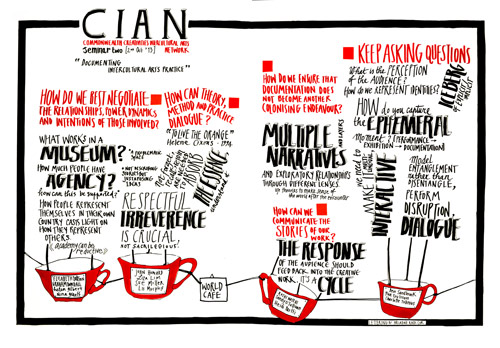 CIAN Public Forum 2: Documenting Intercultural Arts Practice
CIAN Public Forum 2: Documenting Intercultural Arts Practice
Convenor: Brydie-Leigh Bartleet, Queensland Conservatorium, Griffith University, Australia
Abstract:
The forum sought to draw on and interact with practical approaches to intercultural arts performance and performers' richly personal accounts, exploring news ways of engaging, documenting and interpreting intercultural practices, particularly musical improvisation. Download flyer.
See the CIAN network website for details of guest contributors, and further information about the series: http://www.educ.cam.ac.uk/centres/cce/initiatives/projects/cian/
Wednesday 25th September, 13:00-16:00
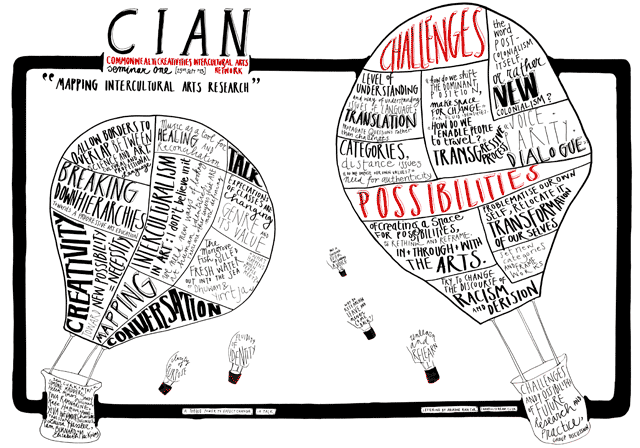 CIAN Public Forum 1: Mapping Intercultural Arts Research
CIAN Public Forum 1: Mapping Intercultural Arts Research
Convenor: Sam Curkpatrick, National Centre for Indigenous Studies (NCIS), Australian National University (ANU)
Abstract:
This introductory forum of the series set out to share and highlight important and emerging themes in intercultural creativities, intercultural arts research and literatures.
Visual minutes / Lettering were produced for all of the fora by Ariadne Radi Cor.
Wednesday 24th July
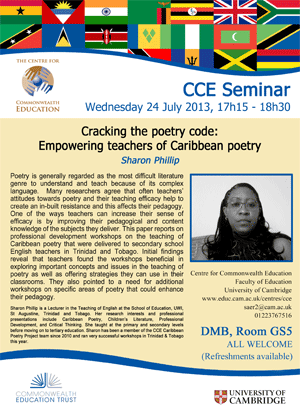 Cracking the poetry code: Empowering teachers of Caribbean poetry
Cracking the poetry code: Empowering teachers of Caribbean poetry
Sharon Phillip, The University of the West Indies
Abstract:
Poetry is generally regarded as the most difficult literature genre to understand and teach because of its complex language. Many researchers agree that often teachers’ attitudes towards poetry and their teaching efficacy help to create an in-built resistance and this affects their pedagogy. One of the ways teachers can increase their sense of efficacy is by improving their pedagogical and content knowledge of the subjects they deliver. This paper reports on professional development workshops on the teaching of Caribbean poetry that were delivered to secondary school English teachers in Trinidad and Tobago. Initial findings reveal that teachers found the workshops beneficial in exploring important concepts and issues in the teaching of poetry as well as offering strategies they can use in their classrooms. They also pointed to a need for additional workshops on specific areas of poetry that could enhance their pedagogy.
Short Bio:
Sharon Phillip is a Lecturer in the Teaching of English at the School of Education, UWI, St Augustine, Trinidad and Tobago. Her research interests and professional presentations include Caribbean Poetry, Children’s Literature, Professional Development, and Critical Thinking. She taught at the primary and secondary levels before moving on to tertiary education. Sharon has been a member of the CCE Caribbean Poetry Project team since 2010 and ran very successful workshops in Trinidad & Tobago this year.
Wednesday 10th July
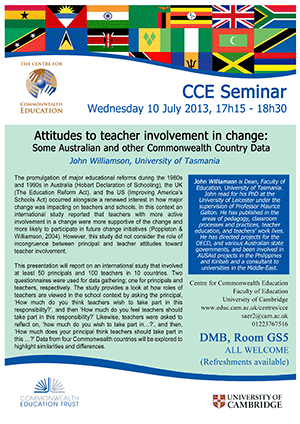 Attitudes to teacher involvement in change: Some Australian and other Commonwealth country data
Attitudes to teacher involvement in change: Some Australian and other Commonwealth country data
John Williamson
Abstract:
The promulgation of major educational reforms during the 1980s and 1990s in Australia (Hobart Declaration of Schooling), the UK (The Education Reform Act), and the US (Improving America’s Schools Act) occurred alongside a renewed interest in how major change was impacting on teachers and schools. In this context an international study reported that teachers with more active involvement in a change were more supportive of the change and more likely to participate in future change initiatives (Poppleton & Williamson, 2004). However, this study did not consider the role of incongruence between principal and teacher attitudes toward teacher involvement.
This presentation reports on an international study that involved at least 50 principals and 100 teachers in 10 countries. Two questionnaires were used for data gathering; one for principals and teachers, respectively. The study provides a look at how roles of teachers are viewed in the school context by asking the principal, ‘How much do you think teachers wish to take part in this responsibility?’, and then ‘How much do you feel teachers should take part in this responsibility?’ Likewise, teachers were asked to reflect on, ‘how much do you wish to take part in…?’, and then, ‘How much does your principal think teachers should take part in this …?’ Data from four Commonwealth countries is used to highlight similarities and differences.
John Williamson is Dean, Faculty of Education, University of Tasmania. John read for his PhD at the University of Leicester under the supervision of Professor Maurice Galton. He has published in the areas of pedagogy, classroom processes and practices, teacher education, and teachers’ work lives. He has directed projects for the OECD , and various Australian state governments, and been involved in AUS Aid projects in the Philippines and Kiribati and a consultant to universities in the Middle-East.
(click on image to download flyer)
Wednesday 26th June
Improving Primary Teacher Education: A Malawi Case
Terry Allsop
Abstract: Across sub-Saharan Africa, it is becoming very clear that many, many children are not learning basic skills in primary schools. There are multiple reasons, but recent seminars in the faculty (Bob Moon and John Pryor/Jo Westbrook) have indicated that the inadequate preparation of primary teachers is a significant factor. This seminar should build on the earlier contributions through reporting on work currently being undertaken in Malawi with the primary teachers colleges and their partnership schools, with a particular focus on the school-based second year spent in often struggling primary schools. Issues to do with demography, funding and sustainability will be considered. Early evaluation findings will be reported.
Short bio: Terry Allsop worked for many years as a science teacher and teacher educator – in the UK, Hong Kong and Uganda. Of these, seventeen years were served in the Oxford University Department of Educational Studies, at a time of considerable experimentation there in school-focused teacher education. He led the Oxford contribution to the creation of the Institute for Educational Development at the Aga Khan University in Karachi, and spent sabbatical time studying science teaching in China. He left Oxford to join the Department for International Development as a senior education adviser, with responsibilities in various African programmes and as manager of the department’s educational research. His final full-time post was as the second Director of the International Research Foundation for Open Learning, based here in Cambridge. He has decided that retirement is a silly idea, recently working in a number of conflict or post-conflict environments. (download flyer)
Monday 20th May
Preparing teachers for early learning in Sub Saharan Africa
John Pryor and Jo Westbrook, University of Sussex
Abstract: This seminar describes the Teacher Preparation in Africa project, a mixed methods research project which investigated the education of teachers in six countries in sub Saharan Africa, with a focus on learning to teach mathematics and reading in the early years of primary school. After a brief presentation of the findings of the project we will go on to discuss ways in which teacher preparation might be conceptualized and planned in such a way as to offer more to those at the start of their career than is currently available.
♦ John Pryor is Reader in Education at the University of Sussex, working especially within the Centre for International Education (CIE). He began his career as teacher in primary and secondary schools with a particular interest in development education. Following a doctorate on gender and group work in education, John took up a post as research fellow and subsequently lecturer at Sussex. His research interests centre on aspects of social identity and equity in education including formative assessment and pedagogy, international and intercultural study and research training and the doctorate in the social sciences. John has directed research projects in both the UK and sub Saharan Africa mostly of a broadly micro-sociological nature including collaborative ethnography and action research.
♦ Jo Westbrook is a Senior Lecturer in Education at the University of Sussex working mostly within the Centre for International Education. She has worked as a secondary school teacher of English in London and in Uganda, where she also worked in teacher education at a National Teachers’ Centre. Jo’s research interests lie in the development of readers and reading communities with a particular interest in comprehension strategies for young and adolescent learners – and in teacher learning. She has been a PI for collaborative research projects on the transition from trainee to NQT in develop
ing countries and most recently on systematic and rigorous literature reviews on pedagogy and teacher education in developing countries.
Wednesday 15th May 2013
Education, inequality and the aspirations of South African youth
Introduction by Adam Cooper
CCE lunchtime seminars are relaxed and informal. We encourage people to bring their lunch, watch a film and participate in discussion. Download poster
Wednesday 1st May 2013ICT and Education in developing countriesIntroduction by Bjoern Hassler |
Educating Teachers in Developing World Contexts: The imperative for radical reform
Bob Moon, Emeritus Professor of Education: The Open University (Monday 29th April 2013)
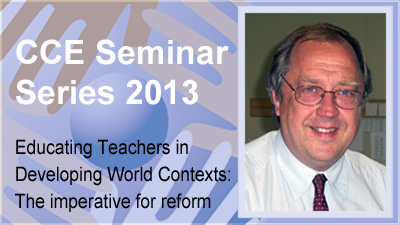 Abstract: The school systems of all developing countries have expanded rapidly over the last decade. The quest to have every child in basic education by 2015 (A Millennium Development Goal) has galvanised governments and international agencies to take action. However the parallel challenge to provide sufficient, well educated, teachers lags some way behind. In many developing countries teacher supply, retention, education and training are verging on crisis. In this context Bob Moon will argue that a radical reform of teacher education structures and systems will be necessary if the life chances of young people are to be improved. In particular he will suggest that the domination of European and North American orthodoxies towards teacher preparation are fostering conservative resistance to change. In making this analysis he will suggest new strategies that need to be embraced, including a rethink of the research priorities currently favoured by international agencies. He will also suggest ways in which the UK Higher Education sector could play a more significant role in responding to the challenge to make global education systems more equitable and just. The presentation will draw on work from the ten country Teacher Education in Sub-Saharan Africa (TESSA) programme that Bob Moon founded and directed as well as his most recent book, ‘Teacher Education and The Challenge of Development’, which was published this year in the series Education, Poverty and International Development edited by Madeleine Arnot and Chris Colclough.
Abstract: The school systems of all developing countries have expanded rapidly over the last decade. The quest to have every child in basic education by 2015 (A Millennium Development Goal) has galvanised governments and international agencies to take action. However the parallel challenge to provide sufficient, well educated, teachers lags some way behind. In many developing countries teacher supply, retention, education and training are verging on crisis. In this context Bob Moon will argue that a radical reform of teacher education structures and systems will be necessary if the life chances of young people are to be improved. In particular he will suggest that the domination of European and North American orthodoxies towards teacher preparation are fostering conservative resistance to change. In making this analysis he will suggest new strategies that need to be embraced, including a rethink of the research priorities currently favoured by international agencies. He will also suggest ways in which the UK Higher Education sector could play a more significant role in responding to the challenge to make global education systems more equitable and just. The presentation will draw on work from the ten country Teacher Education in Sub-Saharan Africa (TESSA) programme that Bob Moon founded and directed as well as his most recent book, ‘Teacher Education and The Challenge of Development’, which was published this year in the series Education, Poverty and International Development edited by Madeleine Arnot and Chris Colclough.
Abstract and Bio A podcast is available at: http://sms.cam.ac.uk/media/1476758.
Transnational fears about marginalized young people at the borders of the nation
Dr Jo-Anne Dillabough, University of Cambridge and Dr Caroline Oliver, University of Oxford (Wednesday 27th March 2013)
Abstract
Mobile, transnational narratives of moral panic have infiltrated and transformed youth cultural activities, while simultaneously affecting multicultural policies in relation to ideas about the nation, race, and migration. The agents of this growing, urban threat are seen to be what former British Prime Minister Margaret Thatcher called ‘the enemy within’, disaffected young people who are characteristically from ethnic or religious minorities and often economically disadvantaged. In the midst of current global political and economic insecurities, we can witness the role of what Etienne Balibar and Chris Rumford (2010) refer to as border anxiety in constituting the ideological borders of the nation. These representations of young people can be read as a form of border work where legitimacy and citizenship are established not only through the use of legal principles such as residency and human rights, but through invisible cultural forces which appear to uphold ‘equality’ for all.
This event was co-sponsored by: EED, CCE, and the David Lam Chair in Multicultural Education
Education in Countries Emerging from Conflict in Africa
Alicia Fentiman and Ilse Wermink (Tuesday 12th March 2013)
Abstract: The seminar focused on the challenges of educational provision in African countries emerging from conflict, highlighting key areas for discussion such as teacher training, identifying the most appropriate means of delivery, reaching out to over-age youth and adults through alternative basic education initiatives, and the political implications affecting the language of instruction. The seminar draws on data from the diverse educational programmes that the Africa Educational Trust has been implementing in some of the poorest countries in Africa, affected not only by poverty, famine and drought but also by conflict and war such as Somalia, South Sudan and northern Uganda. (www.africaeducationaltrust.org).
Podcast & Presentation: A podcast is now available at http://sms.cam.ac.uk/media/1442269. Accompanying presentation also available for download.
Alicia Fentiman is a Commonwealth Fellow at the CCE, University of Cambridge. She is a social anthropologist and has worked extensively in sub-Saharan Africa for over twenty five years on a number of educational research projects and evaluations.
Ilse Wermink is a Programme Coordinator from the Africa Educational Trust in London. She is responsible for the overall management of the South Sudan teacher training project.
Wednesday 6th March 2013
Leadership for Learning in Ghana
Introduction by Stephen Jull
Wednesday 13th March 2013
Education in India
Introduction by Nidhi Singal
CCE Seminar Series and workshops 2012
Wednesday 5th December 2012
HIV/AIDS AND EDUCATION IN SUB-SAHARAN AFRICA
Introduction by Dr. Susan Kiragu
Susan is a Research Associate at the CCE. Her research interests are centred in collaborative educational research in Africa. She has been involved with the ASKAIDS project, investigating how children's everyday and school knowledges can be used in an HIV/AIDS curriculum.
Screening: Mothers helping mothers fight HIV (Mitchell Besser, TED Talks, 2010)
How can mothers with HIV avoid passing it to their children? In South Africa, Mitchell Besser tapped a new resource for healthcare: mothers themselves. The program he started, mothers2mothers, trains new mothers to educate and support other moms.
CCE Seminar Series 2012
Tuesday 20th November 2012
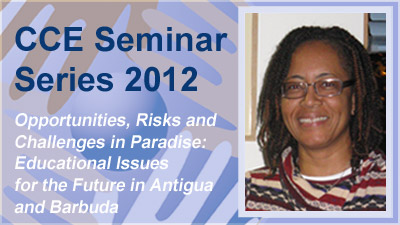 |
Opportunities, Risks and Challenges in Paradise: Educational Issues for the Future in Antigua and Barbuda
Patricia George, Ministry of Education, Antigua and Barbuda
Overseas Research Fellow: Centre for Commonwealth Education
Click on image to view video of presentation. More CCE Seminars available from http://sms.cam.ac.uk/
Abstract: The Caribbean island state of Antigua and Barbuda is about to enter a period of significant change to its education system with the provision of Universal Secondary Education (USE). This move is part of the country’s commitment to fulfilling the Caribbeanised Millennium Development Goals (MDG 2). This presentation will look, among other things, at the educational context in which this change is being enacted. There are many questions that need to be addressed. For example, are we essentially trying to fill old bottles with new wine? Whilst increasing quantity, how do we also attend to the need for improved quality? Who is included in the implied all of USE? How do we provide for all students an expanded view of access to education? How do we go about providing a more inclusive, relevant and responsive education system? How do we get educational practice to align with policy rhetoric? The idea of USE is fraught with challenges and potential risks, yet it provides an opportunity for moving education forward in more meaningful ways.
Bio: Patricia George’s research interests include: mathematics education, specifically making mathematics accessible to all students in a classroom; identity; equality, equity and the general area of the sociology of education; poverty and education; studies that provide cross-national comparisons. Her most recent work involved conducting a social risk assessment of the education system of Antigua and Barbuda as part of groundwork towards universal secondary education. Patricia taught Mathematics and Chemistry in secondary schools in Antigua for 13 years. Patricia currently works as a part-time Research Fellow within the CCE and is involved in the Raising Students’ Achievement Project being conducted in Antigua. The project, among other things, seeks to create communities of practice in which teachers communicate and collaborate on best practices in teaching which enhance students’ learning.
Thursday 1st November 2012
The Use of Evidence to Improve Education and Serve the Public Good - Adrienne Alton-Lee, Chief Education Adviser for the New Zealand Ministry of Education's Iterative Best Evidence Synthesis (BES) Programme.
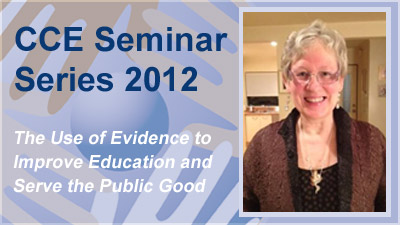
Click on image to view video of presentation. More CCE Seminars available from http://sms.cam.ac.uk/
Abstract: This seminar explores the challenges of mobilising research and development to inform ongoing improvement in valued outcomes for diverse (all) learners across school systems. The Iterative Best Evidence Synthesis (BES) Programme is charged with developing trustworthy bodies of evidence about what does and doesn’t work in education. The approach celebrates the outstanding work of teachers and principals as a resource for improvement and champions a ‘first do no harm in education’ principle. To optimise the usefulness of this evidence BES work is informed by collaboration with teacher unions, school leaders, universities and other stakeholder groups. Summaries of the syntheses are featured on the UNESCO website and have been translated into many languages. The seminar will consider the significance of a new BES innovation – BES exemplars. These have been developed in response to feedback from practitioners about what they need to support their use of evidence to accelerate improvement.
The seminar identifies key messages that can be used to inform effective use of evidence in the service of educational improvement for the public good. The seminar concluded with a discussion of the knowing–doing gap, and affordances for ongoing improvement.
Monday 29th October 2012
Education, a ray of hope touches the nomadic children of Afghanistan
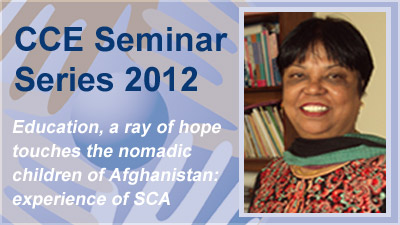
Dr Rafat Nabi joined the Swedish Committee for Afghanistan (SCA) as a Senior Education Advisor in 2008. One of the objectives of the SCA is to provide educational access to the marginalized communities in remote areas of Afghanistan, especially girls. This is done primarily through the establishment and operations of Community Based schools, Girls' Annexes and Model Schools. Nomadic communities are the most marginalized groups of Afghan society and the enrolment rate of Kuchi’s children in school is very low. To provide education to the nomads, SCA initiated specially tailored CBSs in 2009 on a pilot basis and expanded the same after gaining some ground experience. This seminar is based on Dr. Nabi’s in-depth study of the marginalized people of Afghanistan and their educational needs, achievements, challenges, perceptions and lessons learnt.
Bio: Dr. Rafat Nabi is a visiting scholar at the University of Cambridge. She is an educational development professional with over 30 years of extensive field and research experience. She has worked with the Aga Khan Education Service, Pakistan for many years on a variety of educational projects including girls' schooling (formal and non-formal) and adult literacy. Her doctoral studies were in education (University of Bristol 1992-5: teacher training in rural areas of Pakistan) and her post-doctoral studies were on social literacy. She has been working in Afghanistan for the Swedish Committee for Afghanistan for the past 4 years.
Thursday 28th June 2012
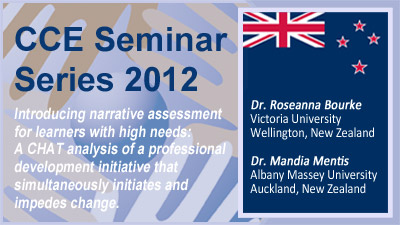 |
Introducing narrative assessment for learners with high needs: A CHAT analysis of a professional development initiative that simultaneously initiates and impedes change
Click on image to view presentation.
Abstract: When young people who experience significant learning difficulties are assessed through traditional school-based assessment measures, the outcomes often reinforce for them, and their parents, what they ‘can’t do’. The inability of standardised assessment tools to convey the complexity of learning in a meaningful, positive frame necessitated a new approach. In New Zealand a new assessment initiative that proposed to narrate, rather than measure learning, was seen as a viable way to capture student learning and achievements in a positive frame. Drawing on their work in New Zealand, Dr Roseanna Bourke (Victoria University, Wellington) and Dr Mandia Mentis (Albany Massey University, Auckland) gave a seminar on the 3-year evaluation of the introduction of narrative assessment for pupils with significant learning difficulties.
Wednesday 13th June 2012
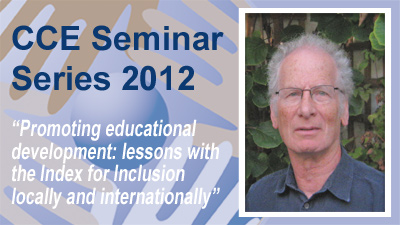 |
Promoting educational development: lessons with the Index for Inclusion locally and internationally (Abstract)
Professor Tony Booth, CCE, Faculty of Education gave a seminar on Promoting educational development: lessons with the Index for Inclusion locally and internationally. Tony has been researching, teaching and writing about participation and exclusion and the principled development of systems and settings in education over more than thirty years. His ideas are summarised within the 'Index for Inclusion; developing learning and participation in schools' which has been translated into 39 languages. He has recently produced a radically revised version to create dialogues for the 2nd decade of the 21st century, the decade of biodiversity, about educational development and informal and formal curricula in schools. A podcast is available for streaming or download at: http://sms.cam.ac.uk/media/1271583
Wednesday 9th May 2012
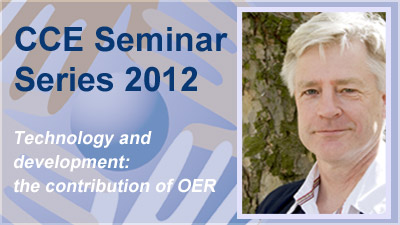 |
Technology and development: the contribution of OER (Abstract)
Tim Unwin, Professor of Geography and UNESCO Chair in ICT4D, Royal Holloway presented a seminar on ICT4D (ICT for Development, to alleviate poverty and improve quality of education and OER and challenges in using them as a case study).
Abstract: The seminar explores the roles of information and communication technologies (ICTs) in development. Too often these are seen as a ‘silver bullet’ that has the potential to swiftly lift people out of poverty. Instead, it is argued that, as with many other technologies, ICTs normally serve primarily to enhance the positions of those in power. Additionally, they tend to be used primarily to impose external solutions on ‘recipient’ communities. Tim asks tough questions about technology and development. In whose interest is technology use in international development? Is it in the interest of the poorest and most marginalised? Are high cost individual technologies the right solution for the poorest? Or is the low-cost communal end of the spectrum the most appropriate area? Should we be working in that area more? If we do want interventions that make a difference to the poorest, how do we go about it?
Open Education Resources (OERs) are widely championed as being an alternative way through which ICTs can indeed be used by such communities for their own benefit and ‘development’. However the reality is that advocacy of OERs often falls into the same traps that other ICT for development initiatives have previously encountered. Drawing on initiatives currently being implemented by the Commonwealth Telecommunications Organisation, the conclusion offers some suggestions as to how such programmes might potentially overcome this challenge.
Alternative formats of the presentation are available to stream or download via the University's Streaming Media Service at: http://sms.csx.cam.ac.uk/media/1257123
Monday 5th March 2012
Learning to aspire: the cross-spatial learning practices and aspirations of South African township youth. (Abstract) A joint CCE/EED seminar was given by Adam Cooper, Reseacher with the Extra-Mural Education Project, Cape Town and PhD candidate at University of Stellenbosch. Adam, hosted by Jo-Anne Dillabough, has worked with Sharlene Swartz contributing towards a toolkit for local government officials working with 'at-risk' youth.
Tuesday 6th March 2012
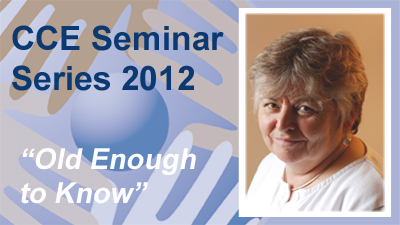 |
Seminar and Book Launch of Old enough to know - Consulting children about sex education in Africa by Colleen McLaughlin, Sharlene Swartz, Susan Kiragu, Shelina Walli and Mussa Mohamed. (Abstract)
Colleen McLaughlin and Susan Kiragu gave a presentation on the ASKAIDS project which is summarised in the book. A pdf of slides from the presentation is available for download and a podcast of the seminar is available via the University's Streaming Media Service.

